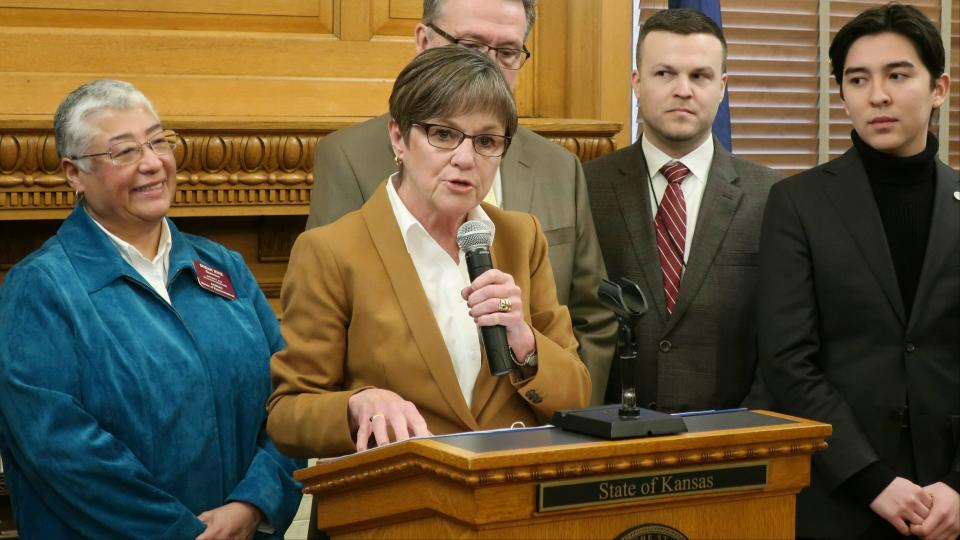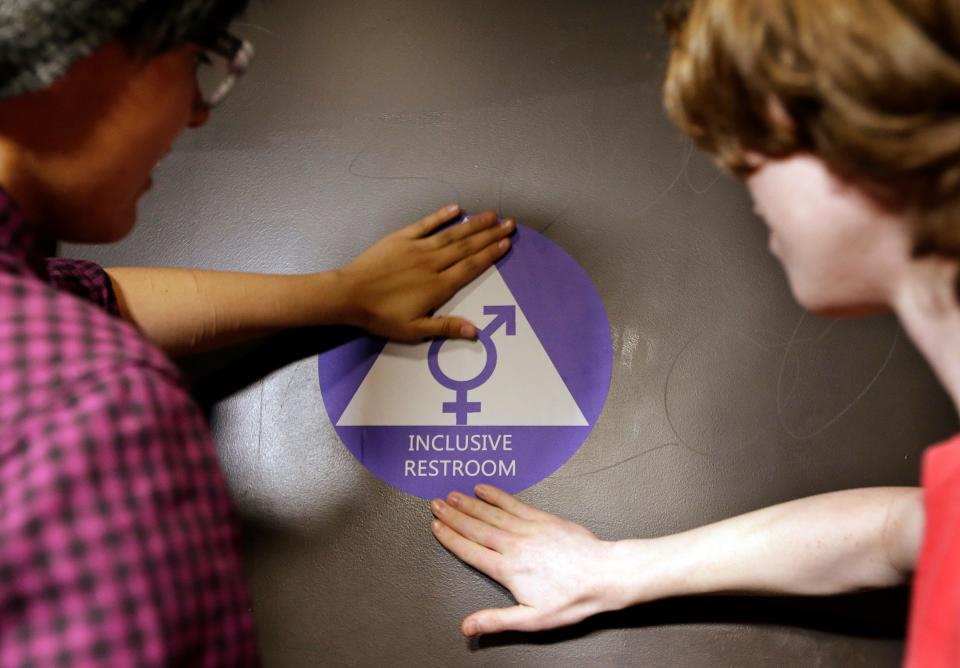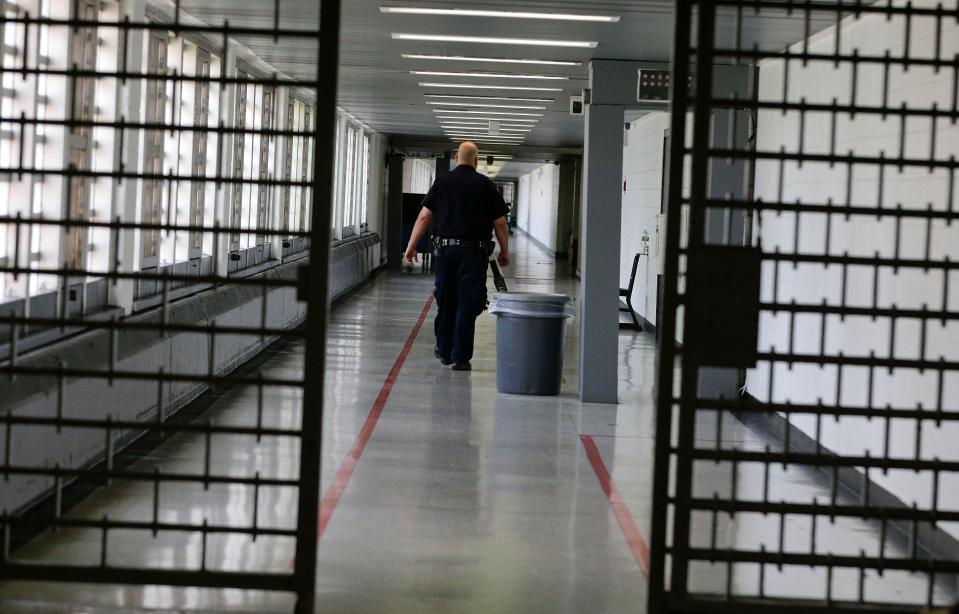LGBTQ people more likely than straight people to end up in prison
By the time she'd approached the Transformative Justice Law Project of Illinois for help last year, the client, a Black transgender woman, had more than 100 arrests on her record.
Growing up in Chicago in the 1980s, she'd been harassed at home and at school and was eventually kicked out of the house at age 14. The adults she turned to for shelter and support were engaged in the drug and sex trades, and by her 20s, she was drug dependent and working the streets.
“From an early age, the adults she went to, who accepted her for being a young trans girl, took so much advantage of her,” said Mol Parker-Kafka, staff attorney for the law project.
Unable to get or sustain a job because of her drug use and gender identity, the woman continued to pursue illicit activities for survival and was eventually repeatedly targeted by police. While she was ultimately able to escape that existence, “she still had that record to deal with when applying for jobs,” said Parker-Kafka, who is trying to help the woman clear her record.

The tale illustrates one route by which many LGBTQ people are funneled into the criminal legal system – a phenomenon that has made LGBTQ people three times likelier to be incarcerated than the general population and more than twice as likely to be arrested compared to straight people. Rates are even higher among LGBTQ people of color and those with disabilities, according to the findings of a comprehensive national report released Friday.
Related video: Members of LGBTQ community face many challenges while traveling
The report, commissioned by the MacArthur Foundation, cites a number of reasons for the disparities, including family rejection of LGBTQ youth, general bias and discrimination and the economic difficulties propagated as a result. The foundation, based in Chicago, is a private foundation supporting nonprofit organizations worldwide.
“Being poor, a person of color and LGBTQ puts you at the intersection of being arrested and incarcerated,” said Tena Hahn-Rodriguez, interim executive director of Black & Pink, an organization serving currently and formerly incarcerated LGBTQ people in Omaha, Nebraska. “Criminalizing poverty is what it comes down to.”
Jane Hereth, an assistant professor of social work at the University of Wisconsin-Milwaukee and author of the report, said the data underscores the unequal treatment experienced by LGBTQ individuals, who are often overlooked in criminal legal reform efforts.
Hereth compiled the report from existing studies and community surveys conducted by a number of organizations, including Lambda Legal, the National Center for Transgender Equality, the National LGBTQ Task Force and the Federal Bureau of Investigation.

Among the document’s other key points:
LGBTQ individuals, particularly transgender people, experience higher levels of harassment and abuse in prisons, with victimization often perpetrated by staff
Incarcerated LGBTQ youth and adults report high rates of solitary confinement or denial of inclusive health care such as gender-affirming treatment
Lesbian and bisexual women are four times likelier than straight women to be arrested, with emerging evidence indicating transgender women of color experience the highest arrest rates
Zero-tolerance policies in schools that increase the likelihood that youths will come into contact with law enforcement disproportionately impact LGBTQ youths.
Spotlighting disparity to make change
Bria Gillum, the MacArthur Foundation’s senior program officer for criminal justice, said the foundation commissioned the report as part of its ongoing safety and justice initiative aimed at initiating criminal justice reform. The foundation is also funding criminal justice reform efforts in 50 communities around the country and gathering data to highlight and help replicate promising approaches.
“We thought it was important to raise the spotlight on this population,” Gillum said. “We knew there was overrepresentation of the LGBTQ community in the criminal legal system, but information is not always captured in a reliable way, so we’re hoping this is a starting point. What are some systemic changes we can make?”
About 11 million people cycle in and out of jail and prison systems annually, she said, but statistics about the LGBTQ population can be challenging to come by. Officials don’t often collect such information, and as a result, the data that does exist can be incomplete or inaccurate.
“Jails don’t really ask what someone’s gender identity is, so a lot of times it’s presumed and often incorrect,” Gillum said.
Advocates said addressing the disparities extends beyond criminal system reform, requiring new approaches to housing, education and employment policies. Those are among the recommendations made in the report, which include advocating for the decriminalization of contributing factors such as homelessness and sex work and ensuring that reentry services such as housing assistance, employment training and substance-abuse services are tailored to LGBTQ individuals.
Parker-Kafka, of the Transformative Justice Law Project of Illinois, said the widespread discrimination can be hurtful. After her client was able to get away from criminal activity, the woman’s record continued to affect her ability to find stable housing and find employment.
“She’s still punished for having this criminal history,” said Parker-Kafka, who is working to help the woman expunge her record. “On top of that, if an employer does a background check they can see that she did sex work, and that’s highly stigmatizing in this country.”

The outcomes can be worse the younger you are. Hereth, the report author, said the data shows that queer and trans youth, especially those of color, “are very intensely impacted.”
She cited a “school-to-prison pipeline” fueled by harsh student punishment policies and the use of police officers in schools to handle infractions, practices she said are known to disproportionately affect students of color but that the data shows also impact LGBTQ youth, especially those who belong to both groups.
One phenomenon that occurs, she said, is LGBTQ students who are bullied but feel unsupported by school officials and as a result lash out in defense, subjecting themselves to harsher punishments than their straight peers.
“There’s certainly bias by people enforcing the rules,” Hereth said.
The prison pipeline starts early for many, according to “Coming Out of Concrete Closets,” a 2015 survey of 1,200 LGBTQ prisoners conducted by Black & Pink, among the organizations cited for their work in the report. Black & Pink provides support services and a pen pal program for the imprisoned and, for those outside, case management and a facility offering unlimited and rent-free housing for those getting back on their feet.
According to the organization’s survey – among those that Hereth gleaned for the MacArthur Foundation report – 58% of respondents said their first arrest occurred when they were under 18 years old.
Angela Irvine, founder and principal researcher at youth-focused Ceres Policy Research, based in Oakland, California, has seen the pattern: LGBTQ youth rejected by families face poverty and homelessness, turn to criminal behavior to survive, then end up detained or arrested – especially queer or trans youth of color.
“And so, as with all youth of color, they’re getting arrested more than white kids and straight kids,” Irvine said.

Meanwhile, she said, a lack of youth respite-care facilities prolongs the cycle by keeping them held in detention facilities longer than necessary. Detention facilities generally attempt to release those brought in for low-level offenses within a short time, but “they can’t release a kid unless they have someplace to go. They want to release them, but they don’t have a place to send them to," Irvine said.
As part of its recommendations for youth criminal justice reform, the report calls for schools to address bullying and victimization without police involvement, provide counseling and support to families of LGBTQ individuals to reduce family rejection and assist queer and transgender individuals who desire to change their legal names.
Advocates also called for redirecting criminal system funds into community housing, anti-bias education, therapy services and needle-exchange programs – “actual programs that help people,” said Hahn-Rodriguez, of Black & Pink. “Anytime something bad happens in our country, people talk about it being mental health, but nobody wants to actually fund mental health care. Put your money where your mouth is.”
The United States, she said, needs to confront continuing homophobia.
“People have this idea that LGBTQ means less than, that people need to be fixed,” Hahn-Rodriguez said. “As long as that is persistent, LGBTQ folks are going to be disproportionately affected.”
This article originally appeared on USA TODAY: LGBTQ representation in US prisons is disproportionately high

